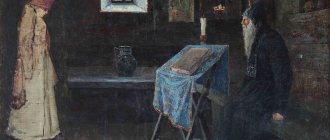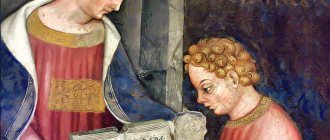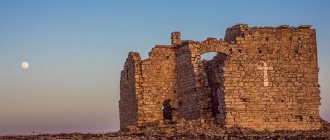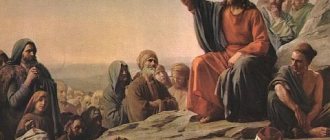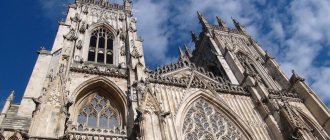The word “fear” is often found in the Holy Letter, prayer books and services. “Lord, instill in me the root of good things, Thy fear in my heart” (from prayers for the coming sleep). Is it really necessary to be afraid in order to believe? Doesn't the feeling of fear paralyze and make people incapable of conscious actions?
In Christianity, the case of the forty Sebastian martyrs is known. They were sentenced to death and must be frozen in the lake. During the execution, one of them could not stand it and ran into the heated bathhouse. One of the guards, seeing the Glory of God, took his place and died a Christian. Why did one fear death, and the second joyfully went to death?
This article is about the fear of God.
Icon of those who overcame the fear of death “Forty Martyrs of Sebaste”. Mosaic, church in Pereslavl-Zalessky, Yaroslavl region.
There are two types of fear - animal fear and fear of the Lord
A person is overcome by an animal fear of death. This feeling is inherent in every living being. The body trembles and becomes numb, obsessive thoughts and fears come.
In addition to the body, a person has an immortal soul, the salvation of which is the meaning of a Christian’s life. Christ commands his followers not to fear death.
(Luke 12:4)
“...do not be afraid of those who kill the body and then are unable to do anything more”
The fear of physical death must be overcome for the sake of the Kingdom of Heaven.
A Christian needs to be afraid of sin, which removes us from God and leads us to fiery Gehenna.
(Luke 12.5) says Christ
“...but I will tell you whom to fear: fear the one who, after killing, can throw you into Gehenna: I tell you, fear him.”
"The Last Judgment."
Novgorod icon of the 15th century. State Tretyakov Gallery, Moscow Solomon in his parables calls: “Fear the Lord and shun evil” (Proverbs 3:7). He who does not fear God always sins.
The fear of sinning is called the fear of God.
Much is written about this fear in the Bible. Saints write about him.
“Therefore, knowing the fear of the Lord, we warn people” (2 Corinthians 5:11) - says the Apostle Paul.
A loving person has no fear, for love casts out fear
Not a single earthly philosophy is capable of freeing a person from the fear of death. Is it possible to overcome this feeling? Yes, you can. Love, as the highest quality of a person, is capable of this. They go to death for love. Martyrs and confessors, having the love of God, endured suffering and accepted martyrdom.
(1 John 4:18)
“There is no fear in love, but perfect love casts out fear, because in fear there is torment. He who fears is imperfect in love."
Anyone who has an animal fear of death has not achieved the perfection of love.
The Apostle Paul writes in his letter:
(Rom. 8:38-39)
“For I am convinced that neither death nor life, nor angels, nor principalities, nor powers, nor the present, nor the future, nor height, nor depth, nor anything else in creation, will be able to separate us from the love of God that is in Christ Jesus our Lord »
Fear and its negative manifestations
According to the dictionary, fear is a feeling of anxiety and panic that depresses a person, internal anxiety caused by an imaginary or real danger.
On the one hand, some feeling of fear is useful and inherent in a person by God. It is necessary to avoid unnecessary danger. For example, healthy fear forces a person who cannot swim not to go deep into the water. The caution generated by this fear encourages the novice driver not to use sharp maneuvers when driving.
However, most often the fears nesting in the soul are far-fetched and exaggerated. A person is afraid of getting sick, getting old, being left alone. He is afraid of the dark and insects, an evil boss and simply the unknown of tomorrow. Man is afraid of life itself.
“Fear is a very painful state, it is even worse than what we are afraid of. And it is fear in most cases that kills, and not the very thing that caused it” (abbot Nektary Morozov).
The Holy Fathers call conceit and pride the cause of all fears. Relying only on one’s own strength and the desire to control everything does not leave room in the soul for God’s help and grace. And without God, a person loses his support and point of balance. Events of even a five-minute future are not under the control of anyone except the Lord.
A person who strives to predict and plan everything himself will inevitably encounter unforeseen circumstances that will sow panic and anxiety in his soul. Without trust in God, a person seems to stand at a crossroads, exposed to all the winds of dangers and fears.
“A proud soul is a slave to fear; trusting in herself, she is afraid of the faint sound of creatures, and of the very shadows” (Rev. John Climacus).
Fear in its various manifestations pushes a person to rash actions and even crimes. There is a lot of evidence of this both in the destinies of individual people and in the history of all mankind.
Jewish priests and ministers sentenced Christ himself to death on the cross for fear of losing their power and authority. And in Soviet times, fear for their well-being forced people to write denunciations against loved ones.
The fear of the Lord is the most valuable quality praised in the Bible
Holy Letter points to the fear of the Lord as an important virtue.
(2 Chronicles 18.7)
“Let the fear of the Lord be upon you”
The Bible has many explanations of what this fear means:
- This is “true wisdom” (Job 28:28);
- He “abides forever” (Psalm 18:10);
- This is the “Beginning of Wisdom” (Psalm 111:10) (Proverbs 1:7);
- This is to “hate evil” (Proverbs 8:13);
- He “adds on days” (Proverbs 10:27);
- It is the “fountain of life” (Proverbs 14:27);
- He “teaches wisdom” (Proverbs 15:33);
- “turns away from evil” (Proverbs 16:6);
- “leads to life, and [whoever has it] will always be content, and evil will not befall him” (Proverbs 19:23);
- “Following humility comes the fear of the Lord, wealth and glory and life” (Proverbs 22:4);
- This is “glory and honor, and gladness and a crown of joy” (Isa. Sirach. 1:11);
- He “will sweeten the heart and give joy and joy and long life” (Isa. Sirach. 1:12);
- This is “a gift from the Lord” (Isa. Sirach. 1:13);
- He “drives away sins” (Isaiah Sirach 1:21);
- “But the sinner hates the fear of the Lord” (Isa. Sirach 1:25);
- “The crown of the elders is many-sided experience, and their praise is the fear of the Lord” (Isa. Sirach. 25:8);
- He “exceeds all things” (Isa. Sirach. 25:14);
- This is a “blessed paradise” (Isa. Sirach. 40.28);
- He “shall be your treasure” (Isaiah 33:6).
Prayers for fear
Psalm 90
He who lives in the help of the Most High will dwell in the blood of the Heavenly God, says the Lord: You are my Protector and my Refuge, my God, and I trust in Him. For He will deliver you from the snare of the trap and from the words of rebellion: His splash will overshadow you, and under His krill you hope that His truth will surround you with weapons. Do not fear from the fear of the night, from the arrow that flies in the days, from the thing that passes in the darkness, from the attack and the demon of the midday. Thousands will fall from your country, and darkness will be at your right hand, but it will not come near you: behold your eyes and see the reward of sinners.
For You, O Lord, are my hope: You have made the Most High your refuge. Evil will not come to you, and wound will not approach your body {your village}: as His Angel commanded you about you, to keep you in all your ways. They will lift you up in their arms, lest you dash your foot against a stone: tread on the asp and the basilisk, and cross over the lion and the serpent. For I have trusted in Me, and I will deliver, and I will cover, because I have known My name. He will call to Me, and I will hear him: I am with him in tribulation, I will destroy him and glorify him: I will fulfill him with the length of days and show him My salvation.
Psalm 45
God is our Refuge and Strength, our Helper in the tribulations of those who have come upon us greatly. For this reason let us not fear; sometimes the earth is troubled, and the mountains are cut into the hearts of the sea. Their waters made noise and trembled, and the mountains were trembled by His strength. The river's aspirations rejoice the city of God: the Most High has sanctified His village. God is in his midst, and does not move: God will help him in the morning. The pagans were in confusion, straying from the kingdom: the Most High gave His voice, the earth moved. The Lord of strength is with us, our Protector God Jacob. Come and see the works of God, even placing miracles on the earth: taking away the battle to the end of the earth, the bow will crush and break the weapons, and the shields will burn with fire. Be abolished and understand that I am God: I will be exalted among the nations, I will be exalted to the earth. The Lord of strength is with us, our Protector God Jacob.
Prayer to the Honest Cross
May God rise again, and may His enemies be scattered, and may those who hate Him flee from His presence. Like smoke disappears, let them disappear; As wax melts in the presence of fire, so let demons perish on behalf of those who love God and sign the sign of the cross, and say in joy: Rejoice, Most Honest and Life-Giving Cross of the Lord, driving away and the demons have the power upon you of our Lord Jesus Christ, who descended into hell and trampled underfoot the power the devil, and who gave us Your Honest Cross to drive away every adversary. Oh, Most Honest and Life-Giving Cross of the Lord! Help me with the Holy Virgin Mary and with all the saints forever. Amen.
Read us conveniently on social networks:
Tags: prayer for fear, prayer for fear and anxiety, prayer for anxiety
A fearful person is not pleasing to the Lord - says Scripture
Animal fear is a natural feeling given by God for self-preservation. Man is the image and likeness of God, and he must be likened to the God-man Jesus Christ. Going to death on the cross, Christ had human flesh and overcame pain and fear. Many of his followers followed Him, overcoming such animal feelings.
New martyrs and confessors of Russia. The icon was created from real photographs by a group of icon painters of the Orthodox St. Tikhon's Theological Institute
Having taken the way of the cross, a Christian must know that God does not love the fearful.
The fearful, who betrayed faith for the sake of temporary life, the Lord calls unfaithful. In this case, fear is a sin.
(Rev 21.8)
“But the fearful, the unbelieving, the abominable, the murderers, the fornicators, the sorcerers, the idolaters, and all liars, shall have their part in the lake that burns with fire and brimstone. This is the second death"
Prayer for Fear
“Prayer is a great blessing,” says St. John Chrysostom. What kind of prayer for anxiety exists in Orthodoxy?
An example of one of the most vivid prayers in moments of spiritual fear and excitement is given by Jesus Christ. As a man, fearing the impending suffering on the cross and death, the Lord prayed until he sweated blood in the Garden of Gethsemane that the cup of suffering would pass by Him. After strong spiritual struggles, the Savior said a prayer that every Christian should arm himself with: “Not my will, but yours, be done” (Luke 22:42).
These words contain complete trust in God and His Providence, which, like summer rain, extinguishes the fire of fear and excitement.
“The prayer must be correct: “Thy will be done!” The Savior Himself, the God-man, showed us in Himself the complete agreement of the human will with the will of the Heavenly Father. And we must imitate the Lord, at least strive for this. This imitation is the basis of our Christian life” (Bishop of Pokrovsky and Nikolaevsky Pachomius).
The Holy Fathers also advise reading the Psalms of David during panic attacks. The Old Testament king David was in mortal danger more than once. He suffered persecution from his former comrade and patron, King Saul. Survived betrayal and persecution from his own son Absalom. At the same time, peace and confidence in Divine Providence always remained in his heart. The psalms of David, which he wrote in moments of emotional unrest and experience, are a real hymn of love and devotion to God. The Holy Fathers especially highlight Psalms 90 and 45, which are read as a prayer for fear.
“To calm yourself, read the ninetieth psalm, in which the Holy Spirit says: Evil will not approach you (Ps. 90:10), and trouble will not come near your village, and so on” (Reverend Anthony of Optina (Putilov).
Holy Fathers: the fear of God is the main thing, without it it is impossible to be saved
The fathers and teachers of the church throughout the centuries have taught the people of God how to get rid of the fears of the carnal nature and how to learn the fear of God.
The best way to know the truth is to read quotes from the greatest teachers of the church.
Holy Fathers about the fear of God.
| Saint | Quote about the fear of God |
Saint John Chrysostom | Living without fear, you cannot accomplish anything noble or amazing. Therefore, the apostle says: “Work out your own salvation with fear and trembling” (Phil. 2:12). And he didn’t just say: with fear, but added: and trembling, which is the highest degree of fear. For if everyday affairs cannot be accomplished without fear, then how much less spiritual ones? Tell me: who learned to read and write without fear? Who has become proficient in art without fear? If, however, where the devil does not lie in wait, but only laziness weighs on us, we need such fear in order to ward off negligence, then with such a struggle, with such obstacles, how can we ever be saved without fear? How can this fear be born? If we think that God is present everywhere, hears everything, sees everything, not only deeds and words, but also everything that happens in the heart and in the depths of the soul: “he judges the thoughts and intentions of the heart” (Heb. 4:12) - if so If we set ourselves up, we won’t do, or say, or think anything bad. … Hold yourself firmly, stand with fear and look cheerfully, so as not to fall from there. For there are many spirits of evil who want to overthrow you |
Venerable Theophan the Recluse | The fear of God is the main thing. When he comes, the good owner arranges everything in his soul in his own way. Do you have it? If there is, thank God and keep it, and if not, wake it up: for it is contained in our spirit, and if it does not manifest itself, it is due to our inattention. From the fear of God, the spirit is crushed, the heart is contrite and humble. Let the feeling of contrition never leave your heart! To maintain the fear of God, one must keep the persistent memory of death and the memory of Judgment. As soon as you wake up, call on this memory and be in partnership with it all day long, as your first advisor. ... For if this is not there, everything else is nothing... |
Venerable Neil of Sinai | When you truly love heavenly blessings... then, just then, you will see terrible temptations, then you will experience terrible battles. Do not lose heart at all, and do not become afraid if low, godless and hateful people revile you... |
Venerable Isaac the Syrian | Just as it is impossible to cross a large sea without a ship and a boat, so no one can achieve love without fear. We can cross the stinking sea between us and mental paradise only on the boat of repentance, on which there are oarsmen of fear. But if these oarsmen of fear do not rule the ship of repentance, on which we sail across the sea of this world to God, then we will drown in this stinking sea. Repentance is our ship, and fear is its helmsman, but love is the divine pier. Therefore, fear takes us onto the ship of repentance, transports us across the stinking sea of life and guides us to the divine pier, which is love. And when we achieve love, then we have reached God, and our path is complete, and we have come to the island of the other world, where the Father, the Son and the Holy Spirit are. |
Saint Tikhon of Zadonsk | The fear of God is the “beginning of wisdom,” without which a person cannot achieve the only true and necessary goal and meaning of earthly life - unity with God for eternal bliss with Him in the Kingdom of Heaven. A person who does not have this gracious fear in himself cannot preserve the image and likeness of God, given to human nature by God at creation. Without the fear of God, a person loses his spirituality, moves away from his Creator, and becomes carnal (Gen. 6:3). Only the presence of the fear of God in a person testifies to his spirituality. In addition, the fear of God, like a faithful guardian, always vigilantly guards the spiritual home of a Christian from all evil. |
Venerable Ephraim the Syrian | Blessed is the man who has the fear of God in himself. He who fears the Lord is truly beyond all enemy tricks and has escaped all the enemy’s snares. Whoever has the fear of God is conveniently saved from the plans of the evil enemy. He who is afraid does not float his mind here and there; because he is waiting for his Master. He who has the fear of God is never careless, because he is always sober. He who is afraid does not indulge in excessive sleep, because he is awake and awaits the coming of his Lord. He who is afraid does not remain indifferent, so as not to irritate his Master. He who is afraid is not lazy, because he always takes care of his property, fearing to fall into condemnation. He who is afraid always prefers what is pleasing to his Lord and prepares it, so that the Lord, when he comes, will praise him for many things. No man is as exalted as he who fears the Lord. He who fears the Lord is like a light, showing many the way to salvation. He who fears the Lord is like a fortified city standing on a mountain; and wicked demons tremble before his face. |
Venerable Simeon the New Theologian | A person must lead his life in faith, in purity, in the fear of God, in reverence, in contrition and tears, thanks to which he is internally cleansed and filled with Divine light and becomes completely filled with the Holy Spirit in a contrite soul. |
Venerable John Climacus | A proud soul is a slave to fear; trusting in herself, she is afraid of the faint sound of creatures, and the very shadows. Fear is an imagined misfortune; or in other words, fear is a trembling feeling of the heart, anxious and lamenting from the idea of unknown misadventures. Fear is the deprivation of firm hope. When the fear of the Lord comes to the heart, it shows him all his sins, and at the same time, the increase in the fear of God is the beginning of love. |
Practical advice
Photo: Flickr.com
To realize overcoming fears, you need to meet them halfway. For example, fear of the dark. You can sleep with the light on all your life, or you can turn it off and walk around the room, first with a lantern, then with a candle, and then by touch, to make sure that there is nothing scary in the dark.
Someone is afraid to talk to strangers and this greatly ruins his life. But you need to be prepared for the fact that the person you need to contact may be rude or offend. And be prepared for it. And when this does not happen, you need to understand that communicating with people can be pleasant and easy. Overcome fear by preparing for the worst, but joyfully accepting the best.
The same goes for the fear of getting sick or becoming weak. You need to prepare to be healthy - toughen up, eat right, spend a lot of time in the fresh air, move, strengthen your immune system. And then, even if the disease occurs, the body will easily overcome it. And if you sit motionless in a stuffy apartment, then your first encounter with infection will end in failure. That is, you need to meet fear again, be ready to meet it.
Orthodox priests about the fear of sinning before God
It is difficult for modern man to instill the fear of God. Most people do not fear God and sin easily. Today, Orthodoxy in all forms of the information field is trying to convey to people a sermon about the fear of the Lord.
Answers from Orthodox priests and preachers about the fear of God:
- Patriarch Kirill. What is the fear of God?
- If you are tormented by obsessive fears. Father's answer.
- Archpriest Vyacheslav Tulupov about the fear of God.
- Archpriest Vladimir Golovin. How to overcome feelings of fear?
- Archpriest Dmitry Smirnov. Fear of God and its role in knowing God.
- Archpriest Andrey Tkachev. Fear of God.
- Archpriest Andrey Tkachev. Who should we be afraid of?
- Professor Osipov A.I. What is the fear of God?
By leaving a comment, you accept the user agreement
Fears of the modern world
Modern man is exposed to many fears every day. There is a rush at work, there is illness, another terrorist attack, and scientists are predicting the imminent end of the world. All this, against the will, instills feelings of panic and anxiety in a person. People sign up for consultations with psychologists, resort to antidepressants, and attend various courses and trainings. At the same time, no amount of effort helps modern man cope with the burden of fears and worries. An Orthodox Christian knows where to find true peace. Therefore, he resorts to God in prayer and trust in Him. Let's consider how Orthodoxy relates to fears, and what kind of prayer a Christian has for fear and anxiety.
“Fear causes great harm: the body relaxes from loss of spirit and deprivation of calm, and without illness, illness occurs” (Reverend Macarius of Optina).
Prayer for Fear
THE CHRONIC FEAR SOCIETY
Stress, depression - what is it if not a state of chronic fear? Modern people are always depressed because they are obsessed with the idea of independence, control, planning. Well, of course, all this should lead to the possession of maximum benefits. And so they, so “independent and self-reliant,” fall into the trap of fear and addiction. Here it is - a real hell, into which such self-confident people, for whom sin is an outdated religious nonsense, end up for their sins. They simply do not understand the main thing: sin is addiction and fear, stress and depression. And faith in God is the path to freedom and happiness. But “repent, for the Kingdom of Heaven is at hand” is not some kind of “scarecrow”, it is a promise: “repent, because this is the only way you can find freedom, happiness and love!” “For you have been called to freedom, brothers. Only do not make freedom an opportunity for the flesh, but through love serve one another” (Gal. ch. 5).
Fear of execution
If we speak without false pathos and with utmost honesty, there is nothing worse in this world than pain and death. And, probably, among the martyrs glorified by the Church there were also those who trembled at the sight of instruments of torture, who overcame horror in the face of impending death. It even happened that it was not possible to overcome this fear the first time, so the saint could even renounce Christ.
This was the feat of the martyr John (of Vilensky) . He lived in the 14th century and, together with his brother Anthony, was a close associate of the Grand Duke of Lithuania Olgerd, who remained a pagan for a long time. It is known that at some point the brothers decided to secretly convert to Christianity, after which they flatly refused to follow pagan rituals.
When the prince found out about this, he called the brothers to him and ordered them to prove their loyalty to him by eating meat on a fast day. But they answered Olgerd that obligation to God was higher than obedience to the prince, and they did not eat meat. Then the ruler ordered the brothers to be thrown into prison. They spent a whole year in captivity. In the end, his stay in prison exhausted John to the limit, and he, secretly from his brother, begged an audience with the Grand Duke and assured him that he was renouncing Christ. That's how he ended up free.
Olgerd ordered Anthony to be released from prison, hoping that he would follow his brother’s example. However, he remained adamant and soon found himself behind bars again: grieving over his brother’s defection, he flatly refused to communicate with him.
John was completely depressed. Every day his conscience tormented him more and more. Even the court pagans mocked him. In the end, he secretly came to the priest from whom he had recently received baptism, and with deep and sincere feeling he repented of his cowardice. Having received instruction and support, he came with renewed determination to the Grand Duke and, in the presence of grinning nobles, loudly, clearly and fearlessly confessed his faith in Christ.
The ruler flew into a rage: there was nothing artificial or superficial in the saint’s voice and eyes. He ordered John to be brutally beaten and then thrown into prison with his brother.
But even now the Grand Duke still hoped to “bring some sense” to his courtier. He ordered Anthony to be killed so that John would falter at the sight of his brother’s execution. Olgerd remembered his recent cowardice and hoped that in prison, all alone, he would break down and would not be able to bear the severity of this new test. But the ruler was wrong.
On the morning of April 14, 1347, Saint Anthony was hanged from an oak tree. But after the interrogation, John remained adamant. All the time remaining before his own execution, he fearlessly preached Christ to the pagans who flocked from all sides to the windows of his prison.
Ten days later the saint was killed. His body was hanged next to his brother - on the same oak tree. And at night, local Christians secretly removed and buried their remains.
The path of John's martyrdom is a deep and poignant example, at least partly revealing what a saint experiences when he defies death. It is impossible to even imagine what kind of courage one must have, and most importantly, to what extent it is necessary to trust God in order to accept all the pain and humiliation of such a feat and overcome this unbearable fear of physical torment and death itself.
Afraid of his pursuers
Not always and not all saints chose the feat of martyrdom. It happened that, fearing for their lives or realizing that physical torment could break them, they fled from their persecutors. And no matter how paradoxical it may sound, this fear, which drove the righteous further and further from death, could also become part of their path to salvation.
Such, for example, is the amazing story of one of the greatest Christian ascetics - St. Paul of Thebes . He was born in the 3rd century in the city of Thebes into a pious family and received a good secular education. Shortly before their death, his parents, in their will, divided all their rich estate between Pavel and his sister, who was already married at that time.
However, as soon as the parents died, the sister’s husband decided to take away his part of the inheritance from Pavel. Just at this time, persecution of Christians began in the city, and Paul’s son-in-law began to threaten that he would hand him over to the authorities if he did not voluntarily renounce his inheritance. At that time, this meant torture and execution.
Many years later, Paul told St. Anthony the Great how, before his eyes, with fanaticism that it would be better not to write about, two very young Christians were tortured to death. He himself then found himself between a rock and a hard place: his son-in-law became more and more angry with him every day, despite the tears and pleas of his wife, and the number of captured and killed Christians in the city grew every day.
And fear took over - Paul left his inheritance to his sister’s husband, and he secretly fled from the city at night and hid in the desert, where he lived in complete solitude for 91 years, constantly praying to God, eating dates and bread, which, according to legend, was brought to him by ravens.
And when, already at the end of the saint’s life, another ascetic, Anthony the Great, came to visit him, he greeted the hermit with such laudatory words: “Rejoice, Paul, chosen vessel and pillar of fire, inhabitant of this desert!” A few days later, he buried the great saint with tears, and then told other hermits about his feat in the desert, which began, it would seem, with ordinary fear.
FEAR DOESN'T LET YOU LOVE
Love is the main theme of Christianity, the highest form of virtue. Love now means anything. But to understand the essence of Christian love, it is enough to turn everything to the same concept - fear, freedom and dependence. For example, why is Christian love a sacrifice? Because sacrifice is freeing yourself from your own addictions. When you sacrifice for someone else, you give up something for yourself. At the same time, Christian love is in no way the kind of love-manipulation, love-control that some loving mothers surround their unfortunate children with. Christian love is freedom for another, when you are not afraid to lose and do not try to cage your loved one. As the Agatha Christie song says, “Where there is fear, there is no place for love.” Because love requires openness and freedom. God loves, Satan cannot love, and therefore cannot be loved - and instead wants to control with the help of lies, addiction and fear. Too often now love is anything but freedom for oneself and another. Instead of love, now there is passion, a painful desire to “fuck” someone, to take possession of someone, as well as mutual lies and dependence - even the term “codependency” was invented.
SINS GENERATE FEARS
Fear is dictated by passions and attachments - the desire to have something or the reluctance to lose some earthly values to which we are attached - health, life, property. The fight against passions is, first of all, the fight against addiction, this is the path to liberation. The Apostle Paul says - everything is allowed to me, but nothing should possess me. That is, sins about power, management, ownership. Looking at the list of deadly sins, you can see that they are all about fear, dependence and attempts to own or control. They are all trying to make Gollum out of man with “his beauty.” Gluttony, fornication - dependence on bodily desires. The love of money is associated with the thirst for possession and power (you can read about how money itself begins to “possess” a person in Pushkin’s “The Stingy Knight”). Vanity is dependence on people’s opinions, a thirst for recognition. Anger, as already said, is the result of fear and a desperate desire to regain control. Understanding that dependence, lack of freedom and fear are the “roots of evil” in any sin, you can easily clarify and expand this list. For example, for some reason alcoholism is forcibly pushed into gluttony, and drug addiction is generally not clear where. But it is clear that these are exactly the same addictions as addiction to food and sex (gluttony and fornication). By the way, “sexaholics” suddenly noticed by Western society simply reveal the same essence of fornication – addiction to sex.

